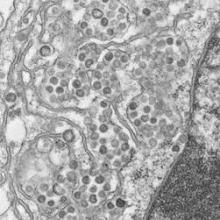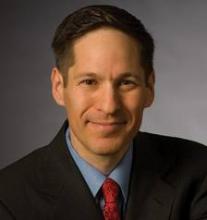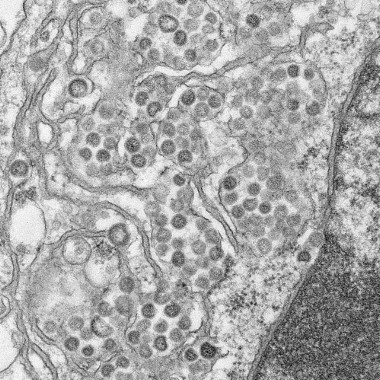User login
The Centers for Disease Control and Prevention has confirmed the second case of Middle East Respiratory Syndrome coronavirus (MERS-CoV) in the United States.
The patient, a health care provider working and residing in Saudi Arabia, first began to experience fever, chills, and a cough on a May 1 flight from Jeddah to Boston. The patient then traveled on two more flights – Boston to Atlanta and Atlanta to Orlando, before being admitted with symptoms to a Florida hospital on May 8.
Lab samples were tested and confirmed in Atlanta on May 11, the CDC announced in a May 12 teleconference.
The Florida patient is isolated and in stable condition, though public health officials continue to identify and reach out to the more than 500 people who may have traveled in close proximity to the infected patient.
The new case does not appear to be linked to the first U.S. case of MERS virus in Indiana, which was confirmed on May 2, officials said.
CDC director Dr. Tom Frieden said in the briefing that the MERS infection behaves similarly to the SARS virus, and that "transmission requires close contact, such as caring for someone infected when sick at home or in the hospital."
Though the health care worker is believed to have worked in a Saudi hospital treating patients with the MERS virus, information is not yet available about whether he or she had direct contact with infected patients.
The MERS virus was first reported in Saudi Arabia in 2012. CDC officials said there has been an international uptake in the number of reported cases since March of this year.
"As of May 12, a total of 538 lab-confirmed cases, including 145 deaths due to MERS, have been reported worldwide," said Dr. Anne Schuchat, director of the CDC’s National Center for Immunization and Respiratory Diseases. A vast majority of cases have occurred in Saudi Arabia, which has reported 450 cases and 118 deaths to date, she added.
Dr. Schuchat noted that despite this second importation of the virus into the United States, risk of infection remains "very low" for the general public, and the virus does not appear to spread easily in community settings. "The clusters of spread are seen most frequently on health care workers caring for MERS patients," she said.
There is no vaccine available to prevent MERS-CoV, but Dr. Schuchat emphasized the importance of practicing basic, everyday precautions such as frequent handwashing, keeping hands away from the face and mouth, staying home when sick, and avoiding contact with sick individuals.
The CDC does not recommend making changes to travel plans at this time, but does urge travelers, particularly those employed in health care settings, to seek immediate medical attention if they experience cough, fever, or respiratory illness within 14 days of travel to the Arabian peninsula.
The Centers for Disease Control and Prevention has confirmed the second case of Middle East Respiratory Syndrome coronavirus (MERS-CoV) in the United States.
The patient, a health care provider working and residing in Saudi Arabia, first began to experience fever, chills, and a cough on a May 1 flight from Jeddah to Boston. The patient then traveled on two more flights – Boston to Atlanta and Atlanta to Orlando, before being admitted with symptoms to a Florida hospital on May 8.
Lab samples were tested and confirmed in Atlanta on May 11, the CDC announced in a May 12 teleconference.
The Florida patient is isolated and in stable condition, though public health officials continue to identify and reach out to the more than 500 people who may have traveled in close proximity to the infected patient.
The new case does not appear to be linked to the first U.S. case of MERS virus in Indiana, which was confirmed on May 2, officials said.
CDC director Dr. Tom Frieden said in the briefing that the MERS infection behaves similarly to the SARS virus, and that "transmission requires close contact, such as caring for someone infected when sick at home or in the hospital."
Though the health care worker is believed to have worked in a Saudi hospital treating patients with the MERS virus, information is not yet available about whether he or she had direct contact with infected patients.
The MERS virus was first reported in Saudi Arabia in 2012. CDC officials said there has been an international uptake in the number of reported cases since March of this year.
"As of May 12, a total of 538 lab-confirmed cases, including 145 deaths due to MERS, have been reported worldwide," said Dr. Anne Schuchat, director of the CDC’s National Center for Immunization and Respiratory Diseases. A vast majority of cases have occurred in Saudi Arabia, which has reported 450 cases and 118 deaths to date, she added.
Dr. Schuchat noted that despite this second importation of the virus into the United States, risk of infection remains "very low" for the general public, and the virus does not appear to spread easily in community settings. "The clusters of spread are seen most frequently on health care workers caring for MERS patients," she said.
There is no vaccine available to prevent MERS-CoV, but Dr. Schuchat emphasized the importance of practicing basic, everyday precautions such as frequent handwashing, keeping hands away from the face and mouth, staying home when sick, and avoiding contact with sick individuals.
The CDC does not recommend making changes to travel plans at this time, but does urge travelers, particularly those employed in health care settings, to seek immediate medical attention if they experience cough, fever, or respiratory illness within 14 days of travel to the Arabian peninsula.
The Centers for Disease Control and Prevention has confirmed the second case of Middle East Respiratory Syndrome coronavirus (MERS-CoV) in the United States.
The patient, a health care provider working and residing in Saudi Arabia, first began to experience fever, chills, and a cough on a May 1 flight from Jeddah to Boston. The patient then traveled on two more flights – Boston to Atlanta and Atlanta to Orlando, before being admitted with symptoms to a Florida hospital on May 8.
Lab samples were tested and confirmed in Atlanta on May 11, the CDC announced in a May 12 teleconference.
The Florida patient is isolated and in stable condition, though public health officials continue to identify and reach out to the more than 500 people who may have traveled in close proximity to the infected patient.
The new case does not appear to be linked to the first U.S. case of MERS virus in Indiana, which was confirmed on May 2, officials said.
CDC director Dr. Tom Frieden said in the briefing that the MERS infection behaves similarly to the SARS virus, and that "transmission requires close contact, such as caring for someone infected when sick at home or in the hospital."
Though the health care worker is believed to have worked in a Saudi hospital treating patients with the MERS virus, information is not yet available about whether he or she had direct contact with infected patients.
The MERS virus was first reported in Saudi Arabia in 2012. CDC officials said there has been an international uptake in the number of reported cases since March of this year.
"As of May 12, a total of 538 lab-confirmed cases, including 145 deaths due to MERS, have been reported worldwide," said Dr. Anne Schuchat, director of the CDC’s National Center for Immunization and Respiratory Diseases. A vast majority of cases have occurred in Saudi Arabia, which has reported 450 cases and 118 deaths to date, she added.
Dr. Schuchat noted that despite this second importation of the virus into the United States, risk of infection remains "very low" for the general public, and the virus does not appear to spread easily in community settings. "The clusters of spread are seen most frequently on health care workers caring for MERS patients," she said.
There is no vaccine available to prevent MERS-CoV, but Dr. Schuchat emphasized the importance of practicing basic, everyday precautions such as frequent handwashing, keeping hands away from the face and mouth, staying home when sick, and avoiding contact with sick individuals.
The CDC does not recommend making changes to travel plans at this time, but does urge travelers, particularly those employed in health care settings, to seek immediate medical attention if they experience cough, fever, or respiratory illness within 14 days of travel to the Arabian peninsula.
FROM A CDC TELECONFERENCE


